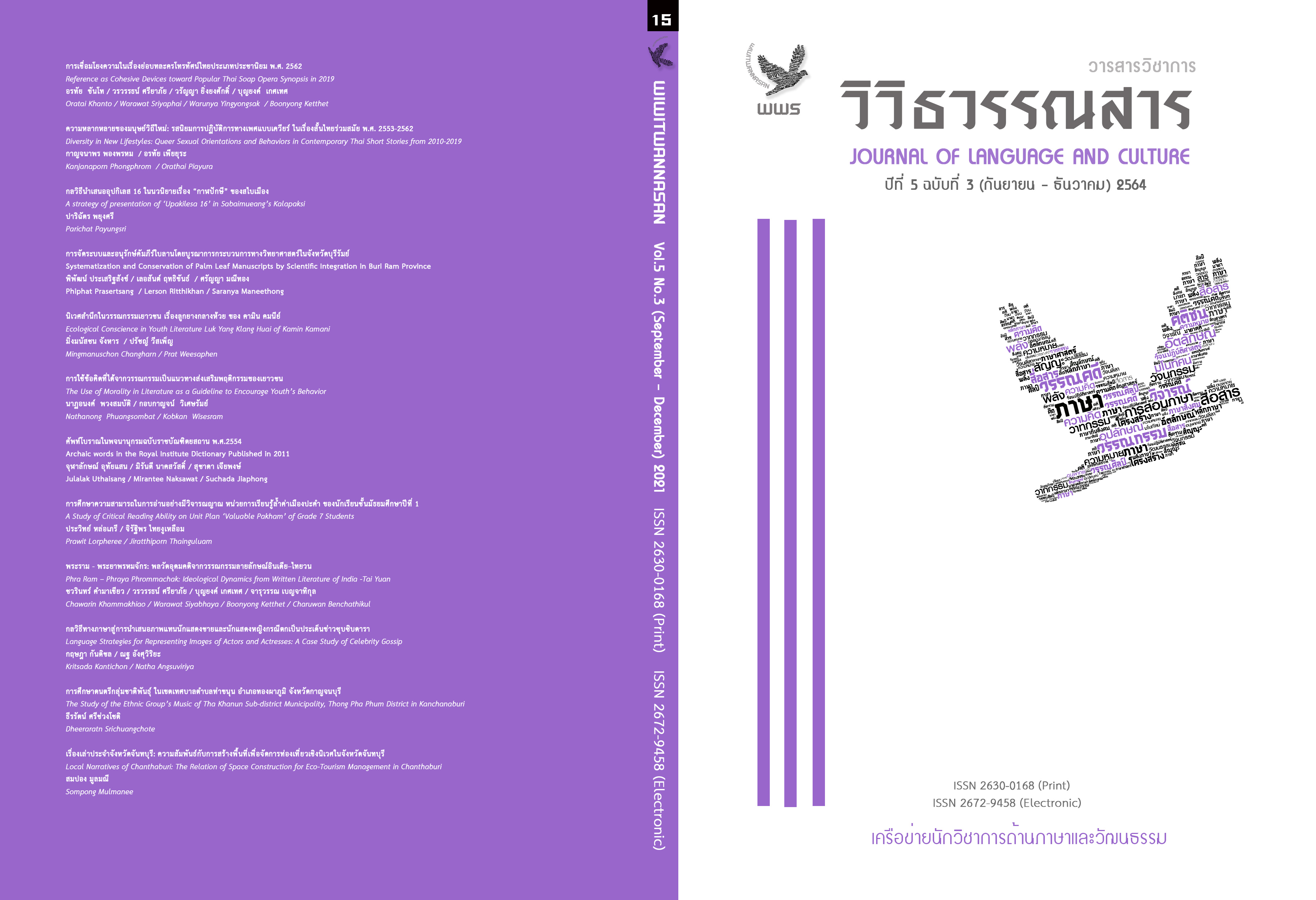นิเวศสำนึกในวรรณกรรมเยาวชน เรื่องลูกยางกลางห้วย ของ คามิน คมนีย์
Main Article Content
บทคัดย่อ
การวิจัยครั้งนี้มีวัตถุประสงค์เพื่อศึกษานิเวศสำนึกในวรรณกรรมเยาวชนเรื่องลูกยางกลางห้วย ของ คามิน คมนีย์ โดยใช้กรอบแนวคิดนิเวศสำนึก ผลการวิจัยพบว่า วรรณกรรมเยาวชนเรื่องลูกยางกลางห้วย นำเสนอสำนึกธรรมชาติและสิ่งแวดล้อมในลักษณะจิตสํานึกเชิงนิเวศแนวดั้งเดิม ที่มนุษย์รู้สึกเป็นส่วนหนึ่งและมีความสัมพันธ์ใกล้ชิดกับธรรรมชาติ และพึ่งพาอาศัยกันและกัน โดยพบลักษณะดังนี้ 1. การเกื้อกูลและการพึ่งพาธรรมชาติ นำเสนอสำนึกของมนุษย์กับธรรมชาติที่ต้องพึ่งพาอาศัยกัน 2. ความรู้ ความเข้าใจ และการเป็นส่วนหนึ่งในธรรมชาติ นำเสนอสำนึกในการใช้ชีวิตอยู่ร่วมกับธรรมชาติด้วยความรู้และความเข้าใจ 3. สำนึกและตระหนักถึงปัญหาในการทำลายสิ่งแวดล้อม นำเสนอสำนึกปัญหาสิ่งแวดล้อม การเข้ามาของเทคโนโลยี และการร่วมมือกันแก้ปัญหาสิ่งแวดล้อมที่เกิดขึ้น
Article Details
ลิขสิทธิ์ของบทความเป็นของวารสาร การพิมพ์ซ้ำจะต้องได้ร้บการอนุญาตจากบรรณาธิการวารสาร
เอกสารอ้างอิง
pp. 95-100.
Glotfelty, C. (2015). Literary studies in an age of environmental crisis. In K. Hiltner (Ed.),
Ecocriticism: The Essential reader. (pp. 120-130). New York: Routledge.
Intongpan, P. (2010). A Comparative Study in Ecology of Buddhist Philosophy and Deep Ecology
through Arne Naess’ Perspective. Manutsayasat Wichakan Journal, 17(2), 71-88.
Kamani, K. (2012). Luk Yang Klang Huai. Bangkok: Satapornbooks
Meekhanmark, S. (1994). Review children's literature. Bangkok: Department of Education
Technology Faculty Education Srinakharinwirot University.
Punnothok, T. (1984). Guidelines for current literature studies. Bangkok: Thai Wattana Panit.
Sangkhaphanthanon, T. (2013). Ecocriticism in Thai literature. Bangkok: Nakorn.
Slovic, S. (2000). Ecocriticism: Containing multitudes, practising doctrine. In L. Coupe, & J. Bate
(Eds.), The Green studies reader: From romanticism to ecocriticism. (pp. 160-162).
London: Routledge.
Thatsakorn, Y. and Sorthip, M. (2018). Ecological Conscience the Mekong River in novel.
Humanities & Social Sciences, 35(3), 90-113.
Thiensawangchai, S. (2017). Suanlangban: Healing ofNature with Technologyas the Villain.
Manutsayasat Wichakan Journal, 24(1), 274-301.
Visate, S. (2011). Pierdomenico baccalario’s juvenile novel century : fantasy and ecological
conscience. (Master’s thesis). Bangkok: Chulalongkorn University.
Wirawan, W. (2019). Nature as a Theme in the Young Adult Fiction, Baan Chai Thung. Journal
of Humanities and Social Sciences, 11(1), 83-108.


